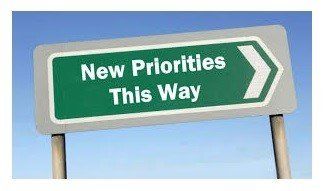How are organisations adapting to the 'new normal'? - Part 2
Jo Brooks
June 24, 2020
What are the priorities right now for your business and your people?

The Senior HR Network conducted a series of interviews with our extensive network of leaders from a multitude of industries both public and private sector, all above SME level, based nationally and internationally to understand their recent Covid-19 experience. Together we explored what life was like immediately after the announcement of ‘lockdown’, their experience thus far and their current thinking around managing ongoing change, transition and the future state.
We asked: What are the priorities right now for your business and your people?
The organisations we spoke to had experienced different pressures depending upon which category they were in as described above.
All organisations we spoke to indicated that their priority was to be able to work safely and to plan how they would approach the restoration of their business, when ready, while protecting the emotional, physical, and financial welfare of their employees.
An immediate focus of those businesses adversely impacted by Covid-19 was the preservation of their cashflow to remain sustainable and to protect jobs wherever possible. These organisations had prioritised measures such as reducing non-critical spend and renegotiating contracts. Many had placed controls around investment in recruitment, training and any other third-party spend and many were seeking to optimise their use of the job retention scheme to retain employees while working to return to their usual "run rate" and the associated generation of income over time.
Where a longer-term reduction in income could be foreseen, many businesses were undertaking rigorous financial planning and option appraisal exercises to formulate a coherent plan and identify the measures required to continue trading safely while remaining financially viable.
The businesses in our survey reflected that they needed to think beyond their internal pressures and work at a sector or macro level, understanding the impact their supply chain could have on them and recognising the knock-on impact that decisions they made now might potentially have on other businesses/communities in the future.
There was evidence in our survey group of the importance of identification of immediate resource and skills gaps, prioritising development and upskilling/reskilling of existing employees and recruitment to key roles, whether on a temporary or permanent basis. While Covid-19 was still in the mix, availability of critical workers to meet demand would remain a challenge as employees naturally continued to contract the virus or need to isolate for the safety of others. Continued access to Personal Protection Equipment (PPE) to support staff to travel and remain at work, if their presence was essential to delivering services, was highlighted as a key concern.
Some business sectors indicated a cyclical recruitment and retention challenge posed by Covid-19, for example, education, and therefore the need to attract enough new business to derive the necessary income to remain sustainable for 20/21 and beyond was paramount. Their success would not only be impacted by their actions but by external influences such as service-user perception and behaviour.
Some organisations had been quick to employ improved communication and support frameworks, including leadership coaching and counselling, to promote trust, empathy and flexibility as their key cultural values and behaviours to support navigation through the disruption.
Overall while the Covid-19 pandemic was not something businesses would have asked for, many acknowledged they had already adapted to new ways of working and wanted to encourage retention of the gains made, by restoring their businesses in a modified form so as not to lose any positive changes which had come about as a by-product of this unprecedented circumstance.
1. Even in times of considerable uncertainty, employees have worked over and above expectation, adapting to different ways of working and finding solutions that might not have been imagined before.
2. The combined impact of fear and uncertainty has required managers to lead differently and brought to the fore the importance of a good communication framework, trust, empathetic leadership, and support.
About the authors
The Senior HR Network was set up to provide senior HR practitioners across the UK and across disciplines to share knowledge, learnings and experiences and expand future thinking in people and organisations.
The Senior HR Network was set up to provide senior HR practitioners across the UK and across disciplines to share knowledge, learnings and experiences and expand future thinking in people and organisations.
Jo Brooks, Aligned HR Services
Telephone: 07788278295
Email: joanna@alignedhrservices.org.uk
Telephone: 07788278295
Email: joanna@alignedhrservices.org.uk
Andrew Carter, Reward Risk Management Limited
Telephone: 07904439172
Email: andrewc@rewardrisk.co.uk
Johanna Hooper, Limitless Peak Performance
Telephone: 07713196730
Email: johanna@limitlesspeakperformance.co.uk
Kirsty Brooks, People Perform Consulting Limited
Telephone: 0333 577 1319
Email: Kirsty@peopleperform.co.uk
Richard Frost, People Perform Consulting Limited
Telephone: 0333 577 1319
Email: Richard@peopleperform.co.uk
Tina Jennings, Cosán Cróga Limited
Telephone: 07765 060298
Email: tina@cosancroga.com
Jane Baalam, Reward Risk Management Limited
Telephone: 07415 974004
Email: janebaalam@rewardrisk.co.uk
Telephone: 07904439172
Email: andrewc@rewardrisk.co.uk
Johanna Hooper, Limitless Peak Performance
Telephone: 07713196730
Email: johanna@limitlesspeakperformance.co.uk
Kirsty Brooks, People Perform Consulting Limited
Telephone: 0333 577 1319
Email: Kirsty@peopleperform.co.uk
Richard Frost, People Perform Consulting Limited
Telephone: 0333 577 1319
Email: Richard@peopleperform.co.uk
Tina Jennings, Cosán Cróga Limited
Telephone: 07765 060298
Email: tina@cosancroga.com
Jane Baalam, Reward Risk Management Limited
Telephone: 07415 974004
Email: janebaalam@rewardrisk.co.uk









